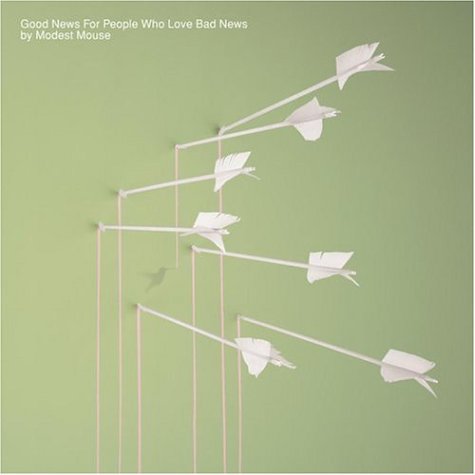
50.
Modest Mouse
Good News For People Who Love Bad News
[Epic; 2004]
The release of Good News For People Who Love Bad News saw a clear change in the direction of the sound of one of the most beloved alternative rock bands, a change that displeased some older fans but brought them a whole bunch of new ones.
The singles from Good News, “Float On” and “Ocean Breathes Salty,” were far more refined and radio-friendly than anything the band had ever previously produced. The rest of the album fits the same vein, each with a clear verse and chorus; something that could not have been taken for granted on older Modest Mouse tracks. The cynicism and meticulous imagery in Brock’s lyrics is still present but presented in a prettier package; he sings a lot more than ever before, his growl and shout take a back seat, only to be used sparingly at opportune moments. These songs have a clear melody, something you can sing along to and get stuck in your head. Obviously, it’s not straightforward pop, there are songs about drugs and of course plenty of mentions of death, but they sit perfectly happily alongside songs about freedom and resilience, and as such make the whole package irresistible.
– Rob Hakimian
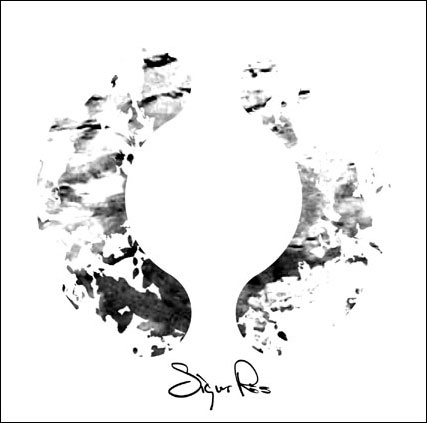
49.
Sigur Rós
( )
[FatCat / MCA / PIAS; 2002]
To follow-up their critically drooled-over second LP Ágætis Byrjun, Sigur Rós simply sidestepped any preconceived notions anyone had about them at the time. Instead of writing beautiful music that sounded like it was made by mysterious aliens, they released an album that is better listened to by yourself while standing in a snow covered field. ( ) has two distinct, but at the same time, completely connected halves as well, with the fourth and fifth track being separated by thirty seconds of silence. The first half is more funereal and toned down, and then starting with “Untitled 5” each consecutive track builds up more and more before a cascade of drums and guitars along with Jonsi Birgisson’s best vocal performance yet (which is saying something) closes out another masterpiece by Sigur Rós on “Untitled 8.”
As with Ágætis Byrjun, Jonsi Birgisson, sings in his own made-up gobbledigook language, Hopelandic, where he basically uses his voice as another instrument. And like the tracklist of untitled songs, and the nameless ( ) that stand for the album’s title, this allows the listener to attach any meaning to these beautiful songs that they please, which, many times, speak louder than anything anyone could ever sing.
– Austin Nauert
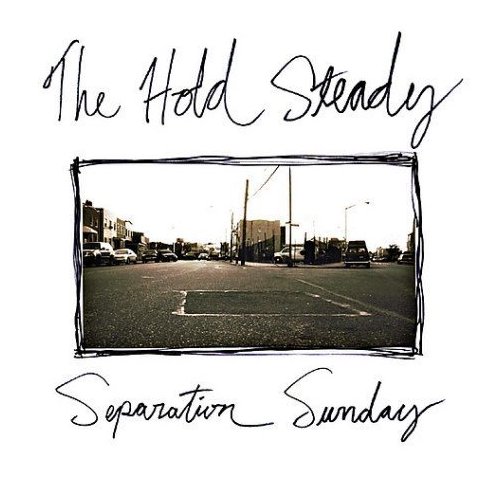
48.
The Hold Steady
Separation Sunday
[Frenchkiss; 2005]
The Hold Steady’s music made itself known to me when I about the same age as most of the characters Craig Finn paints in such loving detail. Granted, I wasn’t huffing nitrous oxide by a riverfront with some dude pretending to be John the Baptist, but there was a connection there that sucked me in; there was in my waning high school years, leaving youthful innocence behind and entering the lovely world of drugs and alcohol. I think this connection I had (and still do have – I’m only 20, yet) with Finn’s lyrics are telling of their authenticity – sure, the band is a bunch dudes in their mid 30s, but the stories told in the songs perfectly encapsulate a certain aspect of youth that’s universally identifiable. Separation Sunday could be said to be The Hold Steady’s peak; I’ve never been certain, as each of their four albums are of pretty similar and excellent quality, but this one embraces the concept album and executes it perfectly, making it their most complete. The swaggering, snarling bar-rock that The Hold Steady specialize in is the perfect frame for this story of Holly, Gideon, et al., one of violence and rough edges and beauty, one that merits a soundtrack filled with as many huge singalong choruses as run-ins with the fuzz, overdoses, and rebirths.
– Bill Delaney
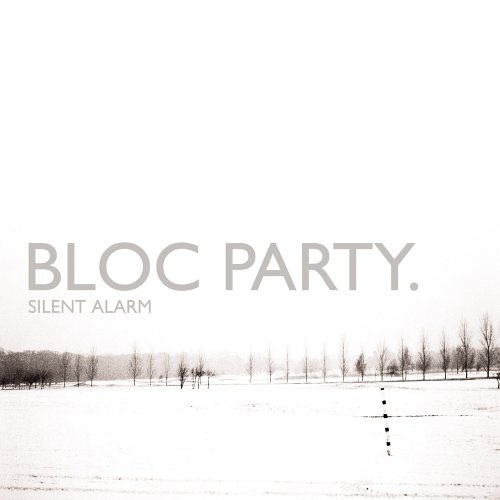
47.
Bloc Party
Silent Alarm
[Wichita; 2006]
In the middle of the decade post-punk revivalism was nothing new, with bands like the Libertines, the Killers and Franz Ferdinand all making a decent living by 2005. But Silent Alarm brought something different to the table. Yes, they were influenced by Gang of Four and Joy Division, and yes they attracted the ubiquitous ‘angular’ adjective, but underneath was something more.
At times emotional, Kele Okereke’s delicate and fragile vocals frame lyrics both politically(“Helicopter,” “Price of Gas”) and personally (the expressive and heartbreaking “She’s Hearing Voices”) all while showing remarkable range. And on top of that, the choppy dance punk was more danceable, more aggressive and ultimately more enjoyable than anything by their peers, in part because of a wider group of influences – not just the classic post-punkers, but also the art rock of Radiohead (who they would later imitate with Intimacy), the spaced out shoegaze of Spiritualized, and the guitar madness of Sonic Youth and My Bloody Valentine. Being unashamed of sentimentality, happy to be intelligent, and not averse to putting balls-to-the-wall and just rocking the fuck out made for a near-perfect debut from a band who would later go on to be one of the most successful in the UK.
– David Biddle
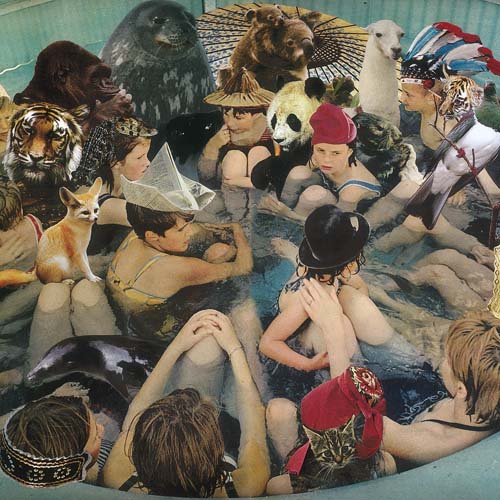
46.
Panda Bear
Person Pitch
[Paw Tracks; 2007]
Person Pitch is one of the strangest, most alien album-full-of-anthems imaginable; there are no guitar licks, no big hooks, no over-earnest vocals, yet it begs it be sung from the rooftops. Modest, conservative ideas like “Coolness is having courage, courage to do what’s right,” “Take one day at a time,” and “I don’t want for us to take pills anymore,” ideas that traditionally have no right to lodge themselves in the brain with such tenacity somehow become hypnotic. Panda Bear’s command of samples no doubt play a part in this, but while the moments of ambience, such as on “Search for Delicious,” take advantage exclusively of Panda Bear’s aptitude with samples, it’s primarily his unique, tumbling sense of melody that serves as the teeth to vocals drenched behind a sunny fog, as seen best on “Take Pills.” And when the two come together as they do on “Bros,” the samples that sound so natural and forest-like, and Panda Bear’s intricate, watery-yet-full-bodied melodies, it evokes not only a finely crafted atmosphere, but a musical statement of far greater weight than one could ever guess based off a single listen.
– Ian Barker
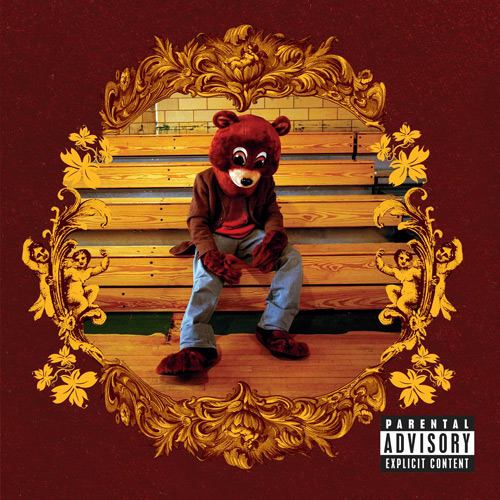
45.
Kanye West
The College Dropout
[Roc-A-Fella; 2004]
It’s hard to believe how fresh this album sounded in 2004, but it’s even harder to believe how great and completely relevant it still sounds in 2010. Every track exudes life-affirming energy even in its most tortured sectors. Kanye has never had the best flow, but his first album lacks some (some, not all) of the hubris that weighed him down on later releases, and even its serious tracks are sprightly humourous – the album rarely feels mired in its own gravity. The College Dropout is a sort of mission statement for Chicago’s finest, a mix of rivetingly-told biography and careful social commentary. Kanye’s storytelling skills are spellbinding, making rather clichéd concepts (“single black female addicted to retail”) sound radical and incorporating a number of often hilarious pop culture references (“Rollies and Pashas done drove me crazy/I can’t even pronounce nothing, pass that Versace!”).
It’s all held firmly in place by Kanye’s deft production, made up of soul and R&B samples, sometimes easily recognizable and sometimes mangled beyond redemption. He turns Luther Vandross and Aretha Franklin into chipmunks and it sounds completely natural, if not simply better. It would be remiss not to mention “Through The Wire,” where he raps over a Chaka Khan sample with his jaw wired shut – and while everyone already knows this story, it doesn’t make it any less impressive. He creates some of the most sinister beats this side of RZA with “Jesus Walks” and “Two Words,” and beats Dre at his own game on “Get ‘Em High” and “Breathe In, Breathe Out.” Perhaps most importantly, he isn’t afraid to simply be himself – geeky, silly and unforgivably arrogant. His posturing sounds like posturing, but it’s all the more lovable – he’s the “first nigga with a Benz and a backpack” after all. He would withdraw inward on his next album and then cannibalize himself on his third before going completely insane on his fourth – a stage he is, unfortunately, still immersed in as of this writing – but we’ll always have this slice of populist, utopian hip-hop to remember him by.
– Andrew Ryce
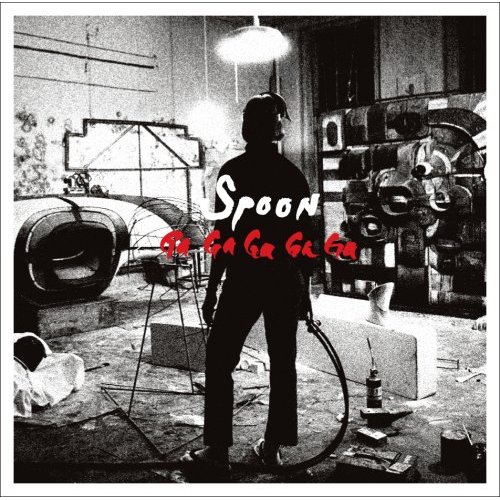
44.
Spoon
Ga Ga Ga Ga Ga
[Merge; 2007]
With Ga Ga Ga Ga Ga Spoon continued their commercial hot-streak since they signed to Merge; the band’s music was more in demand for use on “hip” media than ever before. Cuts from the album could be heard in TV shows such as “One Tree Hill,” in blockbuster movies like “Cloverfield” and they even appeared as musical guests on “Saturday Night Live.”
There was never any question that Spoon had “sold out;” sure, this is arguably their most accessible album to date, but it was still undeniably Spoon. The way that Britt Daniel carries off his vocals with effortless arrogance, the oozing bass and the sprinkles of studio wizardry were all still intact. It seems as though Spoon made an agreement that they would include more hooks, of which there are a relative abundance, as long as they got to include some of their weirdest tracks such as “The Ghost Of You Lingers.” The more accessible ones like “The Underdog” were allowed to roam into the sphere of the general public undetected so that they could hook in thousands of new listeners to hear some of the finest work of one of the most consistent and interesting bands working today. It worked a treat.
– Rob Hakimian

43.
OutKast
Stankonia
[LaFace / Arista; 2000]
I went through a rap phase when I was in junior high, a phase that lasted a few years but consisted of probably fewer than a dozen albums I listened to with any regularity. Stankonia topped the list. Countless afternoons were spent blaring “Gasoline Dreams” and “Bombs Over Baghdad” while I played Nerf basketball in my room until my mom got home and told me I was making too much noise.
A decade later, I revile roughly 99% of hip-hop’s vapid, derivative existence. Outkast makes up a big chunk of that tolerable one percent. On Stankonia especially, the lyrics are clever, the beats are inventive, and Big Boi and Andre 3000 complement each other as well as ever. It’s the best record from one of the only outfits that seems to be trying anymore.
The confluence of musical influences, running the gamut from funk to metal to techno, make Stankonia a musical curio without match. It’s hard to find something that sounds as good but even harder to find something that sounds like it at all, and in the increasingly plagiaristic hip-hop scene, it stands out more and more.
– Adam Clair
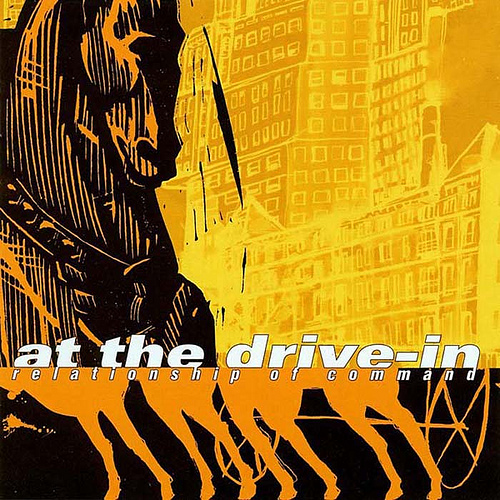
42.
At the Drive-In
Relationship of Command
[Grand Royal; 2000]
Really, what hasn’t already been said about this seminal post-hardcore band and their final opus, Relationship of Command? By now, almost everyone knows that the guys broke up and split off into two different camps, with Cedric Bixler and Omar Rodriguez-Lopez leaving to create The Mars Volta and the other guys (Tony Hajjar, Jim Ward, and Paul Hinojos) forming Sparta. Relationship of Command certainly sounds like a band being pulled in two different directions, with the complex lyrics and Latin-inspired rhythm sections that would later become The Mars Volta’s trademark, coexisting with Sparta-like pop-punk song structure found on tracks like “One-Armed Scissor” and “Pattern Against User.” When the styles merged, it was a marriage that worked to great effect. From the first chill-inducing, jungle drum-heavy track “Arc Arsenal” to the pensive, distortion-meets-piano on the album’s closer “Non-Zero Possibility,” it’s clear that this isn’t your run-of-the-mill punk band. It’s often said that this band launched a thousand pop-punk and third-wave emo acts during the decade, and it’s unfortunate that so many of those bands fell short of matching the musical diversity and passion that At the Drive-In proved they possessed.
– Arika Dean

41.
The Antlers
Hospice
[Self-released / Frenchkiss; 2009]
Have to say, feels a bit odd to be writing about Hospice for this list. It certainly shows an album has got quite a bit going for it if it’s being written about in retrospect less than a year from release. Throughout its fleeting entirety, the album recounts a loss, with all the shit and piss it brings attached and unaltered.
Interestingly, if you put down the words of the album on paper, they’re awkward, and even a bit simplistic. It’s all about the work as it stands with this one: you’re not getting what you should unless you’re listening to it. The band clearly means every damn word and instrumental flourish. When I got my copy, Hospice simply made a lot of sense to me. I’d lost a close friend, and as the best intimate albums allow, words started to change a bit in my head, and the album came to fit my own situation.
The albums (arguably) best track, “Two,” offers up a pretty good idea of the album. The repeating sound of the track demands your attention, pulling you in for a personal confessional. Also stand out is the comparably happy “Bear,” which seeks to regain youthful joys, and the album’s thundering penultimate track, “Wake.” Amidst these songs is contained a near perfectly emotional album, if anything, Hospice deserves praise for allowing grieving and even healing for anyone lucky enough to hear it.
– Chase McMullen

